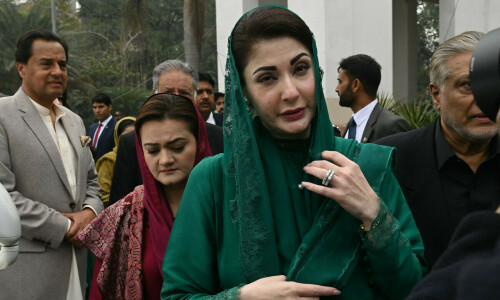ISLAMABAD: Senator Farhatullah Babar — an outspoken leader of the Pakistan Peoples Party known for his stance on issues related to the military and establishment — has resigned from the Senate Standing Committee on Defence, raising several questions.
When contacted on Friday, Mr Babar confirmed that he had resigned from the committee about a month ago. But he did not elaborate the reasons behind his decision and simply said: “Not everything is for the consumption of the media.”
However, some sources said that Senator Babar quit the committee after coming under pressure because he was taking up matters that were deemed to be sensitive in some circles, including the cases of missing people and the issue of accountability of generals and judges.
“I am no longer in the committee and my resignation has been accepted,” he said, adding that another PPP leader, Farooq Naek, had replaced him in the committee.
Last month, members of the defence committees of the National Assembly and the Senate visited the General Headquarters and met Army Chief Gen Qamar Javed Bajwa. During the visit, Gen Bajwa said he wanted to enhance the interaction between the army and parliament.
Senator Babar was, however, not part of the delegation that visited the GHQ.
Although he did not disclose the reasons for quitting the panel, Mr Babar raised tough questions about the parliamentarians’ visit to the GHQ.
He refused to answer when asked whether or not PPP co-chairman Asif Ali Zardari had asked him to resign from the committee.
The senator said the army leadership had been asked to present certain documents before parliament, but it refused do so and instead stated that due to the sensitivity of the documents they could not be taken out of the GHQ.
How come the army could not ensure the secrecy of the documents’ contents at a distance of some 15km from its headquarters, he wondered.
“The GHQ should come to parliament instead of the latter going to the former.”
Senator Babar is still a member of two committees — parliamentary committee on National Accountability Bureau (NAB) laws and Senate standing committee on human rights.
He raised the issue of missing persons in the committee on human rights and was of the opinion that those picked up by intelligence and security agencies should be produced in courts within a specific time frame for any offence they might have committed.
In the parliamentary committee on NAB laws, he had suggested that the definition of holders of public office should be changed and demanded that generals and judges be made accountable under the accountability laws.
Published in Dawn, October 21st, 2017















































